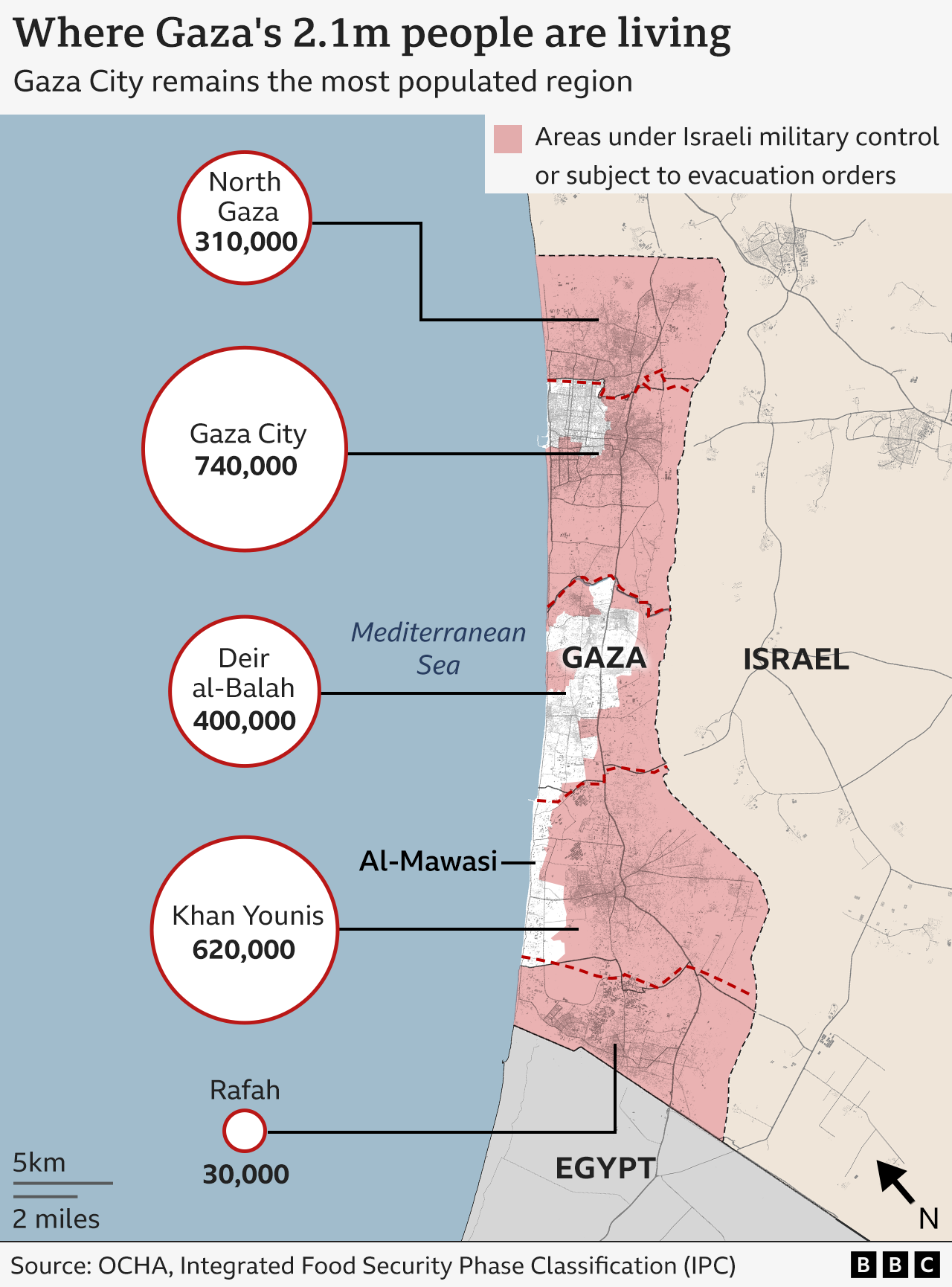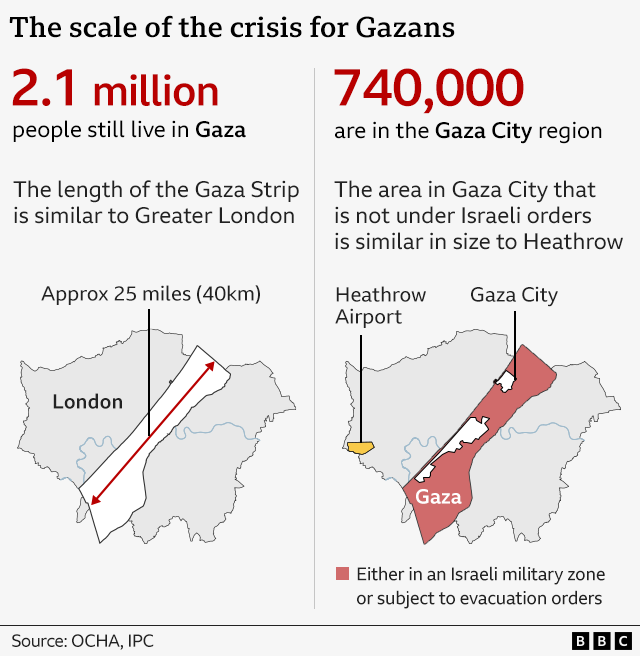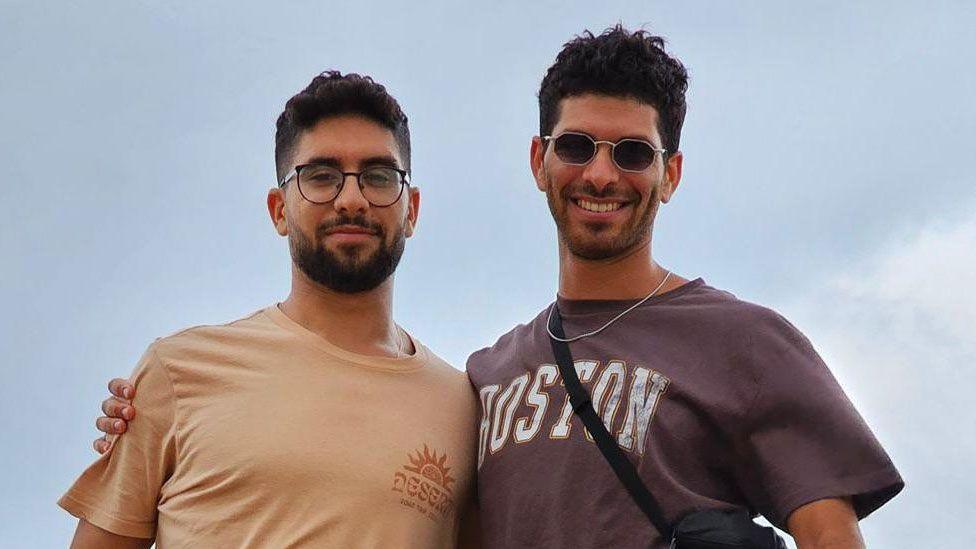What we know about Israel's plan to take over Gaza City

Hundreds of thousands of Palestinians in Gaza City have been struggling to access food because of Israel's blockade and ongoing attacks on the Gaza Strip
- Published
Israel's security cabinet has approved a plan to take control of Gaza City, in a controversial escalation of its war in Gaza.
Hundreds of thousands of Palestinians live in the city in the north of the Gaza Strip. It was the enclave's most populous city before the war.
Several world leaders have condemned the plan, and the UN has warned it would lead to "more massive forced displacement" and "more killing".
Hamas warned of "fierce resistance" to the move.
The plan also faces fierce opposition within Israel – including from military officials and hostages' families.
Israeli Prime Minister Benjamin Netanyahu had told Fox News earlier that Israel planned to occupy the entire Gaza Strip and eventually "hand it over to Arab forces". Much is still very unclear, but here's what we know about the new plan.
What are the details of the plan?
A statement released by the office of the Israeli prime minister said the Israel Defense Forces (IDF) would "prepare for taking control of Gaza city".
It also outlined what it said were five "principles" for ending the war:
The disarmament of Hamas
The return of all hostages, both living and dead
The demilitarisation of the Gaza Strip
Israeli security control over the Gaza Strip
The establishment of an alternative civilian administration that is neither Hamas nor the Palestinian Authority
The IDF said the military would prepare to take control of Gaza City while providing humanitarian aid to the "civilian population outside the combat zones".
It is unclear if this is new aid, and if it will be delivered by the controversial Israel and US-backed Gaza Humanitarian Foundation or another mechanism.
Hamas has said the approval of plans to occupy Gaza "constitutes a new war crime".
"We warn the criminal occupation that this criminal adventure will cost it dearly and will not be an easy journey," it said in a statement on Friday.

Why is just Gaza City being taken over?
Before the cabinet meeting Netanyahu said he wanted Israel to control all of Gaza, but in the new plan only Gaza City is mentioned.
Reports in Israeli media suggest there were heated exchanges with the army's chief of staff, who voiced his strong opposition to a full takeover of Gaza.
Israel has said it currently controls 75% of Gaza, while the UN estimates some 86% of the territory is either in militarised zones or under evacuation orders.
The plan aims to have Israeli forces move to take control of the largest city in the enclave, which has already been heavily damaged by Israeli bombing and ground offensives.
It is surrounded by land that has already been under the IDF's control or subject to an evacuation order.
Control over the city is likely to be the first phase of a full scale takeover of the Gaza Strip, our Middle East correspondent Hugo Bachega says.
There has also been some speculation that the threat of full occupation could be part of a strategy to put pressure on Hamas to make concessions in stalled ceasefire negotiations.
Netanyahu told Fox News Israel does "not want to keep" Gaza and intends to hand it over to "Arab forces".
"We want to have a security perimeter. We don't want to govern it," he told the channel.

When will Israel take over Gaza City?
Israel has not said when the takeover will begin but reports in Israeli media suggest the military will not move into Gaza City immediately - and residents will need to leave first.
Israel said it believed that the "alternative plan" presented to its cabinet would not "achieve the defeat of Hamas or the return of the abductees".
However it it not clear what the alternative plan was or who had submitted it. Israeli media reports it was a more limited proposal from the army's chief of staff.
Netanyahu is being "intentionally vague" over which "Arab forces" he believes could run Gaza, according to the BBC's chief international correspondent Lyse Doucet, as he has been in the past with his plans for the territory.
He may be referring to the Jordanians and the Egyptians, who have said they are willing to work with Israel - but they have made it clear that they will not go into Gaza on the back of an Israeli occupation.
No more details have been shared regarding a timeline for Gaza's post-takeover government.
What has the reaction been?
Netanyahu is facing mounting criticism from hostage families and from world leaders.
UK Prime Minister Sir Keir Starmer has called Israel's escalation "wrong" and that it "will only bring more bloodshed".
On Friday Germany's Chancellor Friedrich Merz said his government will not approve any exports of military equipment to Israel that could be used in Gaza until further notice.
He said it was "increasingly difficult to understand" how the Israeli military plan would help achieve legitimate aims. Historically, Germany has been one of the largest arms suppliers to Israel.
The Palestinian president, Mahmoud Abbas has described the move as a "fully-fledged crime".
Turkey's foreign ministry said Israel aims to "forcibly displace Palestinians from their own land".
The UN's human rights chief Volker Türk says "the war in Gaza must end now" and warns that further escalation "will result in more massive forced displacement, more killing, more unbearable suffering, senseless destruction and atrocity crimes".
The Hostages Families Forum Headquarters said the decision "is leading us toward a colossal catastrophe for both the hostages and our soldiers".
However, the US has been much less critical. On Tuesday, US President Donald Trump said it was "pretty much up to Israel" whether to fully occupy Gaza, and Washington's Ambassador to Israel Mike Huckabee said that the plan is not America's concern.
"It's not our job to tell them what they should or should not do," he said.
- Published4 August

- Published6 August
